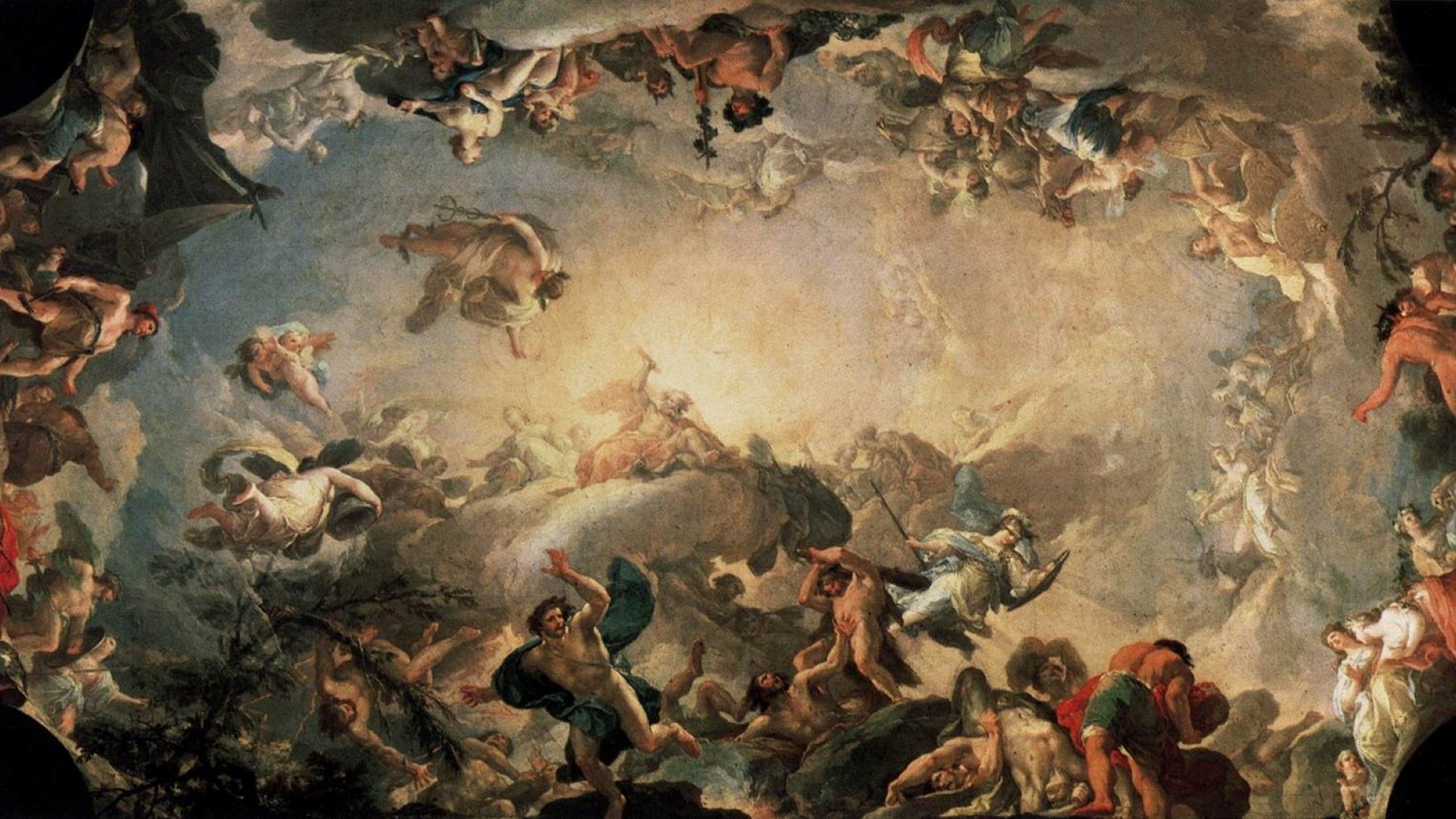
Eurystheus
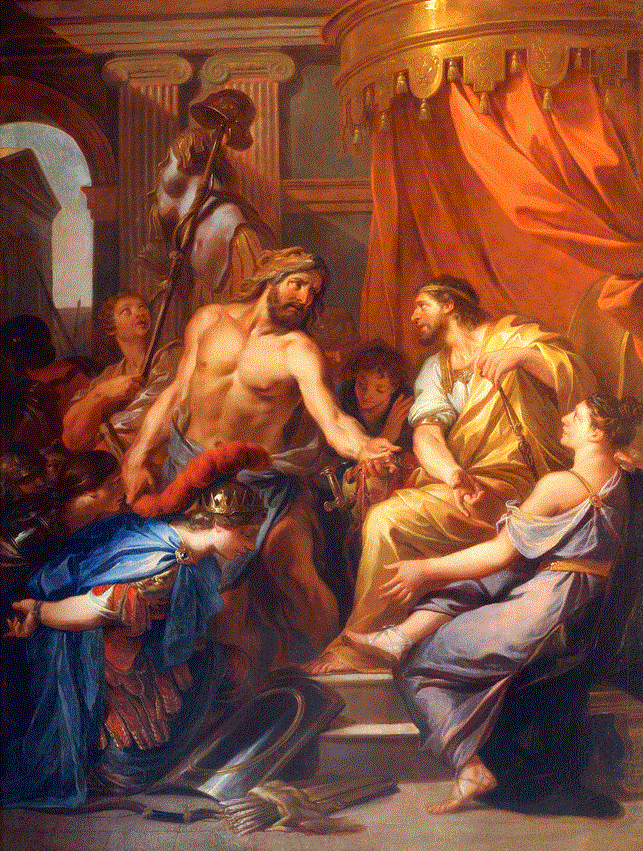
GO TO:
HERCULES
THE TWELVE LABORS OF HERCULES
In Greek mythology, Eurystheus (Ancient Greek: Εὐρυσθεύς, meaning: "broad strength") was king of Tiryns, one of three Mycenaean strongholds in the Argolid, although other authors including Homer and Euripides cast him as ruler of Argos.
Eurystheus was a Perseid, a descendent of the Greek hero Perseus, for Eurystheus was the son of Sthenelus, son of Perseus; Eurystheus being born to Sthenelus' wife Nicippe. The fact that Nicippe was a daughter of Pelops, also made Eurystheus a Pelopides, as well as a Perseid.
Even before Eurystheus was born though, Zeus had made plans for his own son to become king (aka, Heracles), rather than the son of Sthenelus.
Now it might appear that Zeus was usurping the rightful succession to the throne, but Sthenelus had himself taken the thrones when his brother had been accidentally killed by Amphitryon, when in fact the line of succession should have gone through Alcmene’s line, for Alcmene was the daughter of Electryon. The fact that Alcmene was pregnant with Zeus’ son, Heracles, only strengthens Zeus’ plans.
In any case, Zeus had decided what was to occur, and the supreme god made a declaration that a Perseid that was to be born on a certain date was to become king of Mycenae and Tiryns. Zeus was of course referring to Heracles, but the god failed to specify this.
In the contest of wills between Hera and Zeus over whose candidate would be hero, fated to defeat the remaining creatures representing an old order and bring about the reign of the Twelve Olympians, Eurystheus was Hera's candidate and Heracles—though his name implies that at one archaic stage of myth-making he had carried "Hera's fame"—was the candidate of Zeus.
The arena for the actions that would bring about this deep change are the Twelve Labors imposed on Heracles by Eurystheus. The immediate necessity for the Labours of Heracles is as penance for Heracles' murder of his own family, in a fit of madness, which had been sent by Hera; however, further human rather than mythic motivation is supplied by mythographers who note that their respective families had been rivals for the throne of Mycenae.
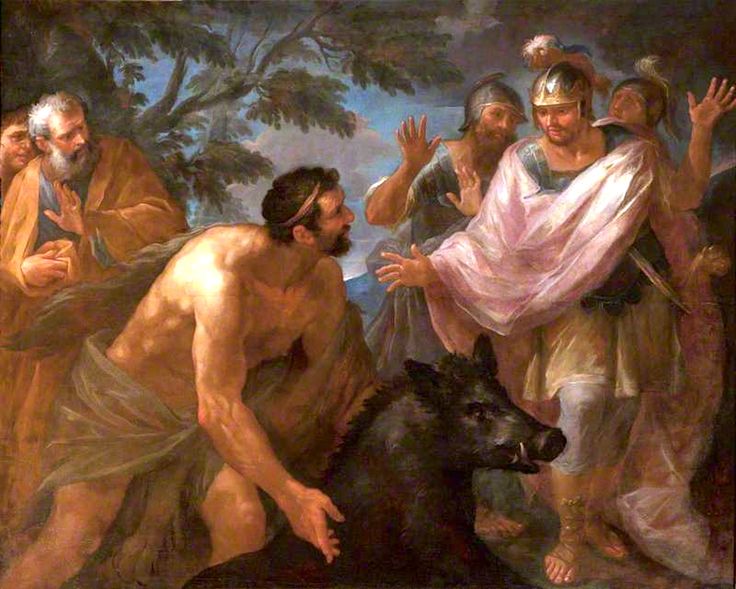
Details of the individual episodes may be found in our article on the Labours of Heracles ( find the link at the beginning of the current article), but Hera was connected with all of the opponents Heracles had to overcome.
When, shortly before his son Heracles was born, Zeus proclaimed the next-born descendant of Perseus should get the kingdom, Hera thwarted his ambitions by delaying Alcmene's labour and having her candidate Eurystheus born prematurely.
To accomplish this, Hera plotted and planned, and using her influence, gained the assistance of Ilithyia, the Greek goddess of Childbirth. Hera now sought to make Zeus’ proclamation come true, just not in the manner that Zeus had intended.
Ilithyia was thus employed to delay the birth of Heracles to Alcmene, whilst bring forward the due date of Eurystheus.
Despite the intrigue of his wife, Zeus was not about to ignore his own proclamation, and so Eurystheus would become king of Mycenae and Tiryns, although he was forever indebted to Hera. Hera, of course, was not content with simply depriving Heracles of the throne, and would set about trying to kill the son of her husband.
Sthenelus would eventually die, and Eurystheus would become king of Mycenae and Tiryns. Eurystheus would wed Antimache, daughter of Amphidamas of Arcadia. Eurystheus would therafter become father to one daughter, Admete, and five sons, Alexander, Eurybius, Iphimedon, Mentor and Perimedes.
On the other hand, Heracles had been born and raised in Thebes, and there had married Megara, the daughter of Creon; by Megara, Heracles had become father to two sons. Hera though was still tormenting Heracles, and so the goddess sent Madness down upon him, resulting in Heracles killing his wife and children.
When he came back to his sense Heracles travelled to Delphi to ask the Oracle how he could be absolved of his sins. The Oracle told Heracles that he must travel to Tiryns and there enter the service of King Eurystheus for a number of years. Thus, Heracles was to become a servant in the kingdom he should have been ruling.
Overall, Heracles' first task was to slay the Nemean Lion and bring back its skin, which Heracles decided to wear. Eurystheus was so scared by Heracles' fearsome guise that he hid in a subterranean bronze winejar, and from that moment forth all labors were communicated to Heracles through a herald, Copreus.
For his second labour, to slay the Lernaean Hydra, Heracles took with him his nephew, Iolaus, as a charioteer. When Eurystheus found out that Heracles' nephew had helped him he declared that the labour had not been completed alone and as a result did not count towards the ten labours set for him.
Eurystheus' third task did not involve killing a beast, but capturing one alive—the Ceryneian Hind, a golden-horned hind or doe sacred to Artemis. Heracles knew that he had to return the hind, as he had promised, to Artemis, so he agreed to hand it over on the condition that Eurystheus himself come out and take it from him.
Eurystheus did come out, but the moment Heracles let the hind go, she sprinted back to her mistress, and Heracles departed, saying that Eurystheus had not been quick enough.
When Heracles returned with the Erymanthian Boar, Eurystheus was again frightened and hid in his jar, begging Heracles to get rid of the beast; Heracles obliged.
The fifth labour proposed by Eurystheus was to clear out the numerous stables of Augeias. Striking a deal with Augeias, Heracles proposed a payment of a tenth of Augeias' cattle if the labour was completed successfully. Not believing the task feasible, Augeias agreed, asking his son Phyleus to witness.
Heracles rerouted two nearby rivers (Alpheis and Peneios) through the stable, clearing out the dung rapidly. When Augeias learned of Heracles' bargain for the task, he refused payment. Heracles brought the case to court, and Phyleus testified against his father.
Enraged, Augeias banished both Phyleus and Heracles from the land before the court had cast their vote. However, Eurystheus refused to credit the labour to Heracles, as he had performed it for payment. So Heracles went and drove Augeias out of the kingdom and installed Phyleus as king. Heracles then took his tenth of the cattle and left them to graze in a field by his home.
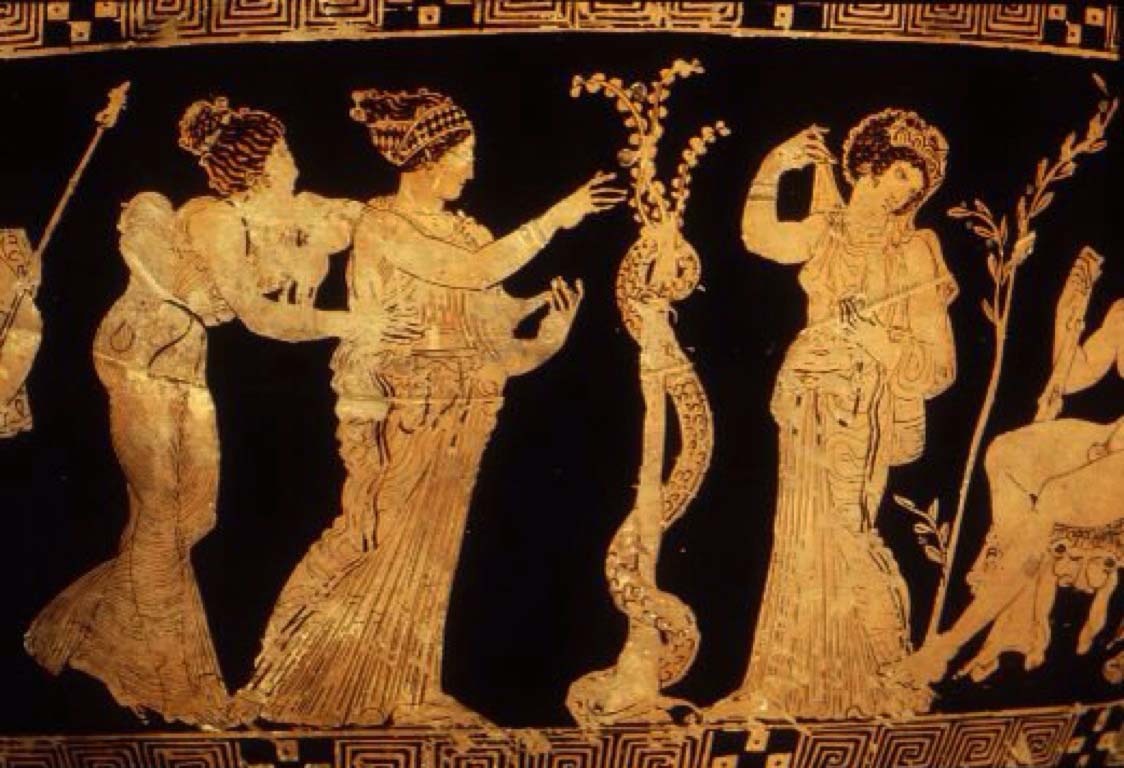
For his sixth labour, Heracles had to drive the Stymphalian Birds off the marshes they plagued. He did so, shooting down several birds with his Hydra-poisoned arrows and bringing them back to Eurystheus as proof.
For his seventh labour, Heracles captured the Cretan Bull. He used a lasso and rode it back to his cousin. Eurystheus offered to sacrifice the bull to Hera his patron, who hated Heracles. She refused the sacrifice because it reflected glory on Heracles. The bull was released and wandered to Marathon, becoming known as the Marathonian Bull.
When Heracles brought back the man-eating Mares of Diomedes successfully, Eurystheus dedicated the horses to Hera and allowed them to roam freely in the Argolid. Bucephalus, Alexander the Great's horse, was said to be descended from these mares.
To acquire the belt of Hippolyte, queen of the Amazons was Heracles ninth task. This task was at the request of Eurystheus' daughter, Admete. For the tenth labour, he stole the cattle of the giant Geryon, which Eurystheus then had sacrificed to Hera.
To extend what may have once been ten Labours to the canonical dozen, it was said that Eurystheus didn't count the Hydra, as he was assisted, nor the Augean stables, as Heracles received payment for his work. For the eleventh labour Heracles had to obtain the Apples of the Hesperides; he convinced their father, the Titan Atlas, to help him, but did his share of work by temporarily holding up the sky in the Titan's stead.
For his final labour, he was to capture Cerberus, the three-headed hound that guarded the entrance to Hades. When he managed to bring the struggling animal back, the terrified Eurystheus hid in his jar one more time, begging Heracles to leave for good and take the dog with him.
The years past and after Heracles died, Eurystheus remained bitter over the indignity the hero had caused him. He attempted to destroy Heracles' many children (the Heracleidae, led by Hyllus), who fled to Athens.
Eurystheus assembled a large army and the descendants of Heracles found that they had few places of refuge left to them in the face of such an army; eventually though, many Heraclides found sanctuary in Athens.
When the Mycenaean army arrived at Athens King Demophon (or Theseus) refused to give up those that he had given refuge to, and so a battle erupted between the Athenians and their Heraclides allies, and the Mycenaens.
Ultimately the battle was won by the Athenians and the Heraclides, and Eurystheus was killed, possibly by the son of Heracles, Hyllus.
Hyllus certainly cut off the head of Eurystheus, and presented it to his grandmother, Alcmene. Alcmene promptly gouged out the eyes of the dead king in retribution against the acts done to her son and her descendants.
It was though not a descendant of Heracles who took over the kingdoms of Eurystheus, for some say Tiryns returned to the kingdom of Argos, whilst the kingdom of Mycenae had been left in the care of Eurystheus’ uncles Atreus and Thyestes.
When the news of Eurystheus death reached them, the people of Mycenae decided that one of Eurystheus’ uncles should be king, which resulted in disagreement between Atreus and Thyestes, with many crimes undertaken by both.
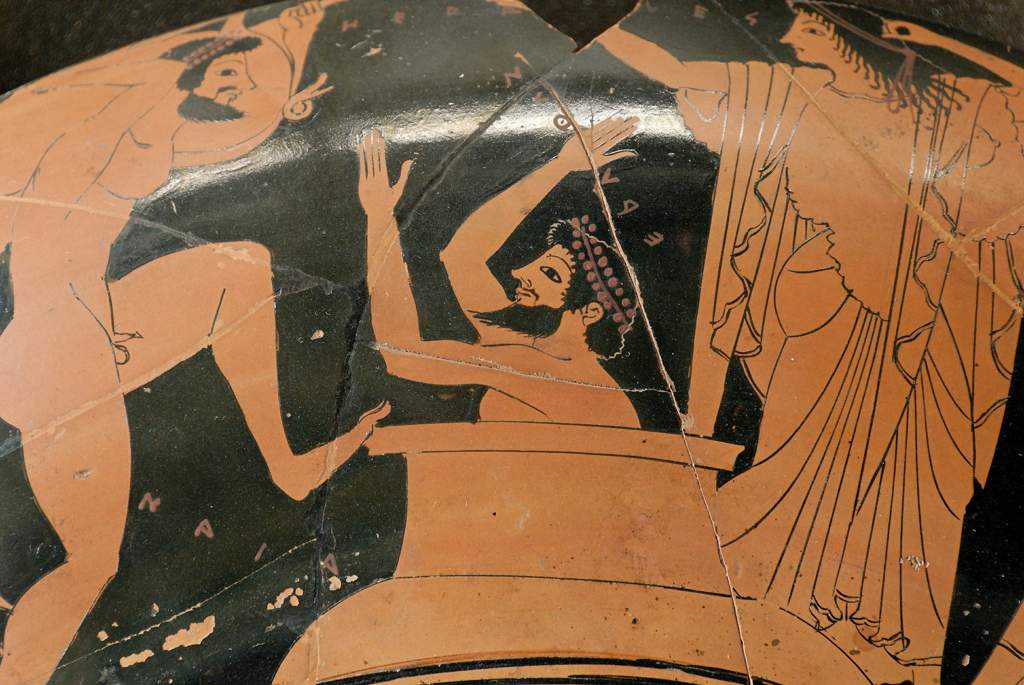
Eurystheus in Euripides
Eurystheus was a character in Heracleidae, a play by Euripides. Macaria, one of the daughters of Heracles, and her brothers and sisters hid from Eurystheus in Athens, ruled by King Demophon. As Eurystheus prepared to attack, an oracle told Demophon that he would win if and only if a noble woman was sacrificed to Persephone.
Macaria volunteered for the sacrifice and a spring was named the Macarian spring in her honor. Eurystheus speaks prophetically of his burial within Attica, claiming that he will be an anti-hero of sorts, though one who will eventually protect the Athenians.
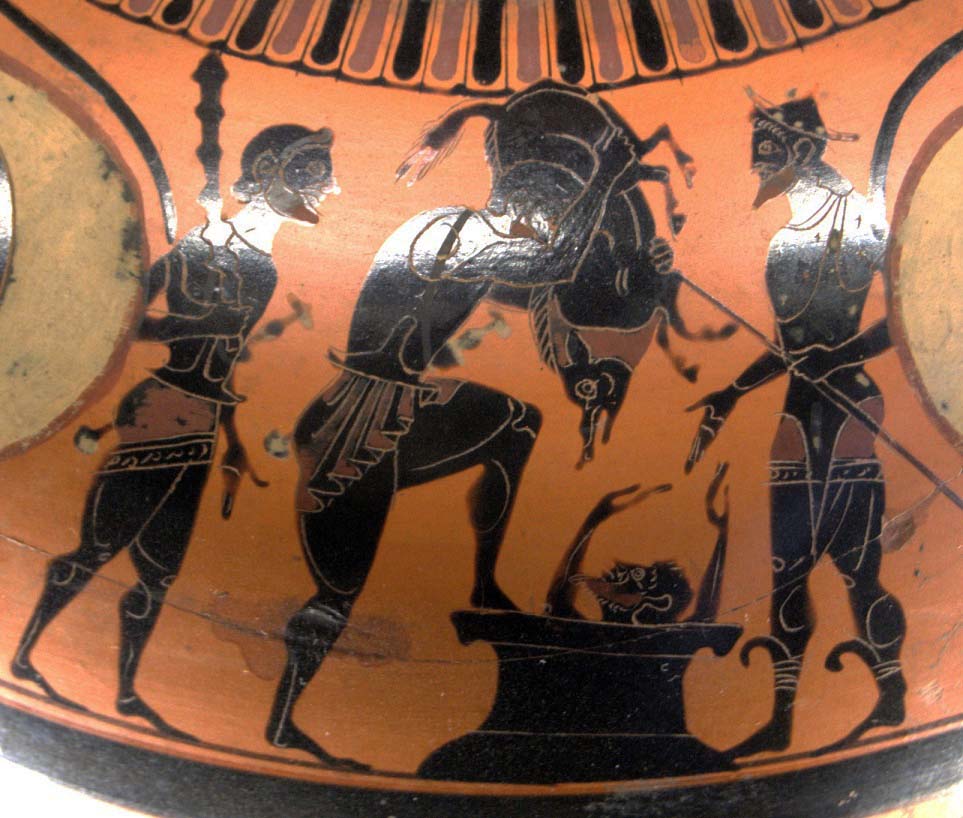
Sources
Antimache (Ἀντιμάχη) does not feature further in Greek myth, aside from a list of names of her sons and a genealogy for her, given in Pseudo-Apollodorus, Bibliotheke 2.5.9, 2.8.1, 3.9.2.
Pseudo-Apollodorus, Bibliotheke 2.5.9, 2.8.1, 3.9.2.
Powell, Barry B. (2015). Classical myth. Pearson.
See Carl A.P. Ruck and Danny Staples, The World of Classical Myth (1994) VII. "Herakles: Making the New Olympia", pp.163-202.
Walter Burkert, Greek Religion (1985) p. 210: "Heracles seems to carry Hera's name in his own, as if Hera were his fame (kleos), yet all we ever hear is that from beginning to end,this jealous wife of Zeus persecutes her step-son with unrelenting hatred." For Hera's connection with each of Heracles' opponents, see under the individual Labours.
Pseudo-Apollodorus, Bibliotheke 3.8.1 and Diodorus Siculus 4.57 give Hyllus as the slayer, Pausanias 1.44.10 and Strabo 7.6.19 give Iolaus.
Heracleidae vv. 1026-1044.
Pseudo-Apollodorus. Bibliotheca, 2.5.10.
Strabo, viii.3.19, Pausanias, v.5.9; Grimal 1987:219.
Pseudo-Apollodorus, Bibliotheca 2.5.1–2.5.12.
Isocrates. "1.8".
Hard, Robin, The Routledge Handbook of Greek Mythology: Based on H.J. Rose's "Handbook of Greek Mythology", Psychology Press, 2004.
Kerényi, Carl, The Heroes of the Greeks, Thames and Hudson, London, 1959.
"Wikipedia"
Our Mobile Application
Check out Our Mobile Application "Ancient Greece Reloaded"


